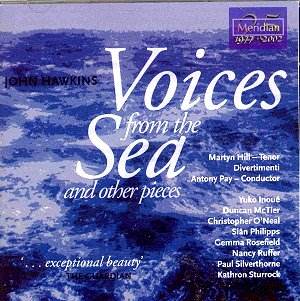John
Hawkins was a student of composition at London's City Literary
Institute. Later he studied with Elisabeth Lutyens and Malcolm
Williamson. I sought out this CD based on my favourable impressions
of Hawkins's Sea Symphony broadcast by the BBC in 1982.
The symphony was commissioned in 1980 by The Marine Society. They
even went so far as to send the composer on a voyage; no cruise-liner
though. Instead they sent him on a container ship. When the 20
or so minute work was played by the Bournemouth Symphony Orchestra
conducted by Uri Segal it came across as a vivid pictorial impression
of the lonely marine wastes - tonal, melodic and with profound
intentions.
Having
complete the Symphony the composer wanted to follow it with a
vocal piece on the same subject. Dr Ronald Hope, first director
of The Seafarers' Education Service, pointed Hawkins towards an
anthology of poems called Voices from the Sea. The live
recording here is of the 1985 premiere. The words are printed
in full in the booklet.
Martyn
Hill is at ease with his often declamatory role singing over a
strenuous torrent of string writing typical of 1930s and 1940s
Britten (Serenade) and Tippett (Concerto for Double
String Orchestra) in the first song and wispily insubstantial
in the second. Crow's Nest is conspiratorial, full of melodic
touches (also evident in the last song) and inventive. The murderous
cold-hearted sea is reflected in Home is the Sailor and
A Laugh in the Wind. The polar draw of home and sea holds
the sailor in pained equipoise in Sailor's Warning. This
cycle would pair well with Geoffrey Bush's Farewell Earthís
Blisse, Summer Serenade and Hesperides as well
as the late Carey Blytonís superb song-cycle Lachrymae and
The Dark Forest, a fine song cycle for the self-same forces
by Pamela Harrison.
The
remaining fifty minutes are occupied by a sequence of chamber
pieces, mostly of miniature scale. The piano Variations freely
migrate between dissonance and tonality in a series of mood paintings
which, unlike some sets of variations, do not sound academic.
Waiting, with its snivelling viola, is morose. The three
Brief Encounters, Gestures and Shadows suggest
episodes in some psychologically equivocal wasteland between life
and death although in the case of Shadows remembered dance
is an element (not a step distant from Ravel's La Valse).
The threatening mists continue in Worlds Apart though in
music that sometimes suggests Bloch. Disturbed Nights calls
out in imperious modesty with playing that recalls the desolating
woodwind voices in Warlock's The Curlew; a very
fine piece indeed and devastatingly effective for a completely
unaccompanied oboe. Quietus would pair nicely with William
Alwyn's String Trio being severe and uncompromising. Both composers
wrote or have written symphonies with romantic aspirations or
consummation but both could write with rigour as well - Quietus
is an example as is Alwyn's Trio and Second Symphony.
Hawkinsís
is a distinctive and instantly engaging voice on the British scene.
He is not alone (listen also to the music of Lionel Sainsbury,
Arthur Butterworth and Matthew Curtis) but tragically it seems
that such composers must struggle against an indifference engendered
by the avant-garde institutional elitism inculcated in the 1950s
and the following three decades. I hope that circumstances will
permit the recording of Hawkins' Sea Symphony and his choral
work, This World.
Rob
Barnett
